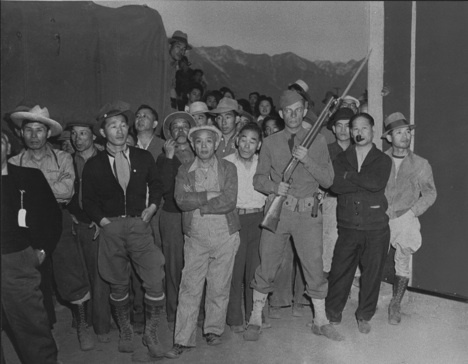How to Honor Frank Emi
Frank Emi, the last surviving member of the Fair Play Committee that led draft resistance among Japanese-American internees during World War II, died earlier this month. His obituary, which appeared in yesterday’s New York Times, set the scene of Emi’s resistance quite beautifully:
[He was] among more than 110,000 Japanese-Americans, most from the West Coast, who were herded from their homes to inland detention centers after President Franklin D. Roosevelt, within three months of the attack on Pearl Harbor, issued Executive Order 9066, deeming them threats to national security.
“The military escorted us to the camp with their guns and bayonets, so there really wasn’t much thought about standing up for your rights at the time,” [Emi] later told the Japanese-American oral history project at California State University, Fullerton.
The phrase he heard among the detainees was “Shikata ga nai”–it can’t be helped.
That would change two years later, after the government had begun drafting detainees into the military. Ordered to fight for the country that had imprisoned them, many were defiant, Mr. Emi among them. At Heart Mountain they formed a protest committee to organize a protest, arguing that they would serve only after their rights had been fully restored. More than 300 detainees in all 10 detention camps joined their cause.
For Mr. Emi, the mantra became “No more shikata ga nai.”

Japanese Internees and Guard "Greet" New Arrivals at Manzanar (War Relocation Authority)
Mr. Emi and six other internees formed the Fair Play Committee to organize resistance against the draft; the group was nicknamed the “no-no boys” by those who feared that the resistors’ stance would reflect poorly on the Japanese-American community.  Though a great number of Japanese Americans did join the military–and proved their loyalty in the most decorated unit in the U.S. Army, the 442nd Regimental Combat Team–resistance to the draft was also very strong in the community. In 1943, more than one out of every four Japanese-American males born in the United States refused to pledge “unqualified allegiance” to the nation. In this video, you can listen to Emi describe the “ridiculous” loyalty questionnaire he and other internees were asked to sign.
Mr. Emi and the other resistance leaders were charged with conspiracy by the FBI. Â (He had earlier been arrested for trying to leave the camp, telling the guards that he was an American citizen and they hadn’t done anything wrong.) Â For organizing draft resistance, Emi and the other Fair Play Committee members were sentenced to three years in jail, though they were released after 18 months. In this interview, he says he would not do anything differently:
I never felt that we did anything wrong. That if we had to do it again, probably would have done the same thing. ‘Cause, I don’t know why but I felt that injustice that the government perpetrating on us was so great. That uh, I just couldn’t reconcile the fact they would put us in there and then expect us to be put into, respond to the army just like all the people on the outside. That didn’t make sense.
Later in life, Emi led the effort to gain reparations from the U.S. government for surviving internees. He also spoke out about the parallels between the treatment of Japanese Americans in World War II and the racial profiling of Arab Americans following 9/11. Given that the incoming chairman of the House Committee on Homeland Security plans to hold hearings on the “radicalization of the Muslim community”, I hope that Emi’s death can be a teachable moment to talk about violations of civil liberties during wartime. In particular, in addition to teaching the story of Japanese internment, we should discuss the effects that racial profiling and accusations of disloyalty have on those accused, be they Japanese Americans in the 1940s or Muslim Americans today.
(For educators, I recommend the Wing Luke Asian Museum’s “Day of Remembrance” curriculum to teach about and commemorate Japanese-American internment.  Days of Remembrance, held on February 19, commemorate the day that FDR issued Executive Order 9066, and are more commonly observed on the West Coast. The Wing Luke curriculum also includes an extension called “Struggles in Our Democracy: The Aftermath of September 11, 2001” that makes explicit connections between internment and post-9/11 discrimination towards Arab Americans. One may also want to visit the site and watch the PBS film about the draft resistors, Conscience and the Constitution.)
Last 5 posts by Leah Nahmias
- Teaching "What This Cruel War Was Over" - March 28th, 2011
- State of Siege and Public Memory at Ole Miss - March 25th, 2011


